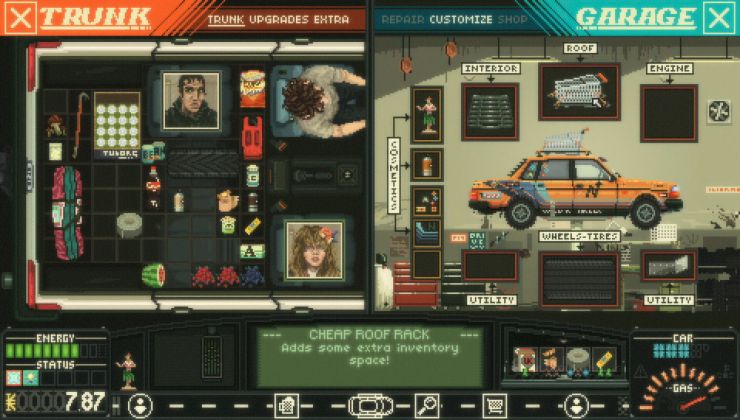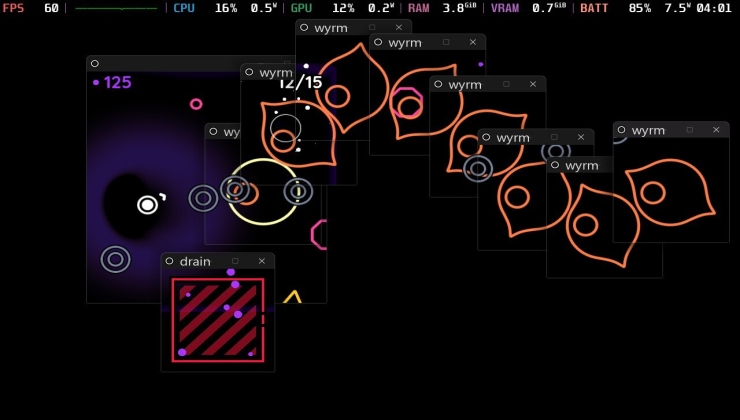There comes a time when everyone has to sit and think about what they use on their PC, especially if you're on Linux. For me, Arch Linux (via EndeavourOS) just wasn't working out any more and so I've moved to Fedora.
While I was reasonably happy with Arch Linux, it's just not stable enough for me personally. It's a very subjective thing of course, and highly dependent on what hardware you use — along with how often you update. For me, it just messed things up a bit too often, and last night was the final straw.
I updated either that day, or the day before, and just before a livestream was due to start, my SteelSeries headset no longer worked. No matter what I tried, following guide after guide about PipeWire, nothing helped. Just this weird and very quiet electrical static noise whenever I tried piping audio to it. Eventually it worked again by some downgrading, plus random hotplugging and testing it on a Windows machine for a sanity check and it started somewhat working again. My Microphone was another issue, at the same time it decided to be ridiculously quiet for no apparent reason I could see so there were wider problems. I had enough, I had work to do and after hours of hair-pulling — hello from Fedora.
Thankfully, with the likes of Flathub / Flatpak packages and how far along apps like Discover have come along for installing packages and setting things up, there's not a whole lot to learn. It's been a very long time since I used Fedora, and it was one of my first Linux distributions I tried sticking with back when it was "Fedora Core" and wow — it's always surprising to see how far we've come as a platform for doing anything.
Fedora does come with some of its own issues, like NVIDIA drivers being a nuisance to install, which they definitely should improve. If other distributions can do one-click or one-line installs, I'm sure they could do it too. However, it's just another point towards me swapping to AMD when prices settle, or perhaps Intel when Arc properly launches for desktop. I also need to figure out why Dropbox won't load on startup, some little things like that.
Anyway, are you really a Linux nerd if you don't distro-hop at least once a year? Jokes aside, I look forward to seeing why people keep recommending Fedora nowadays as a stable distribution, let's see how long it takes me to break it.
... When I switched to Fedora Silverblue ...
Oh hey a Silverblue user with sort of similar specs to mine! How do you like it for gaming, if I can ask? :)
Works about as well as anything else. Steam runs as a Flatpak and I maintain a Toolbx container for the miscellaneous Itch.io and GOG games that require more specific dependencies. There are some annoyances, like for instance I haven't found a reliable way to run SC Controller yet, but generally speaking it hasn't gotten between me and my games at all. Most stuff just runs OOTB on the Steam Flatpak and for the rest I can drop down to a Toolbx and pretend it's an ordinary Fedora.... When I switched to Fedora Silverblue ...
Oh hey a Silverblue user with sort of similar specs to mine! How do you like it for gaming, if I can ask? :)
The real benefits of Silverblue are obviously elsewhere. I like the simplicity of the system updates and separation of system, apps and development environments. Being able to rollback bad updates (including OS version updates) and updating my dev environments separately from my system is also neat.
I started with Slackware, installed from something like 75 floppy disks. A few years later I bought a new compupter, with a gfx card known to work with XFree86, and a boxed version of Red Hat Linux 4.0 with the Red Baron web browser bundled in. Then Debian for a few years. APT was a revelation - no more RPM dependency hell. Next up was Gentoo. I wrote most of the original ebuilds for wifi support.
But, after the first kid, I bounced around of a while. Tried Fedora and a few others, but I got too used to having the latest software features in a rolling release, so was never happy. Tried Arch and it stuck. I did use Manjaro for several years on my work computer at my previous company, but always Arch at home.
I think switching now would be a lot easier. Most of the applications I use have reached, more-or-less, a steady state. With CI builds and snaps/flatpacks it's not a huge amount of work to use a newer version than what is packaged with your distro, anymore.
I haven't been in a situation like Liam where something broke that I needed immediately. Close with the update to libvirt-8.1 in February, but I had my work laptop handy, so used that instead of my usual Anarchy Linux VM, before pinning libvirt back to 8.0 - finally found the config setting I needed to change this past Wednesday after testing with 8.2. It's usually the work laptop reminding me how much more stable Linux is than Windows. 1909 was good, but the two versions that IT updated me to since have constant freezes and multiple BSODs a day. If they let me, I'd wipe that machine in a second. Seriously considering it and dealing with the consequences.
It kinda make me sad that everyone forget about openSUSE and it is such a great and solid distribution. 😢Just the last two days I've been booting an openSUSE VM at work to do some database testing. So it's not forgotten! And I guess if I'm ever fed up with Ubuntu at home, it's either going to be Debian or openSUSE. Though without the original yast it's just not the same any more :-(.
Works about as well as anything else. Steam runs as a Flatpak and I maintain a Toolbx container for the miscellaneous Itch.io and GOG games that require more specific dependencies. There are some annoyances, like for instance I haven't found a reliable way to run SC Controller yet, but generally speaking it hasn't gotten between me and my games at all. Most stuff just runs OOTB on the Steam Flatpak and for the rest I can drop down to a Toolbx and pretend it's an ordinary Fedora.... When I switched to Fedora Silverblue ...
Oh hey a Silverblue user with sort of similar specs to mine! How do you like it for gaming, if I can ask? :)
The real benefits of Silverblue are obviously elsewhere. I like the simplicity of the system updates and separation of system, apps and development environments. Being able to rollback bad updates (including OS version updates) and updating my dev environments separately from my system is also neat.
Oh, using the toolbox for itch and gog games is pretty clever! :)
Thanks for the reply
rebooting several times since it just didn't install all packages downloadedare you sure you arent mistaking it with windows by accident?
Yes, I am. Doing a system update it triggered the "you need to restart" after every package instead after all were downloaded and ready to install.
In Gnome Software that works, in discover it was bugged (switched 2 weeks ago from KDE to Gnome, so it's likely to be still not fixed).
I tried Fedora before going with Mint, and Steam was unable to launch any game. I really appreciated PipeWire, though! Then I tried POP, and it as Flatpaks that were unable to launch! Mint was the winner of the day.
Good luck with fedora. I will never touch anything connected to red hat. They are just Microsoft of the linux world. and before you say i dont know what i am talking about or i never tried it, i ran it on ibm power, x86 for years... Only because i had to. I have hadany meetings with redhat both technical and corporate. I hate how they force shit down everyones throat (systemd, removing stuff from gnome (you do know they maintain gnome right) and apparently pipewire, etc.) Redhat was great back in the 90s when they cared.
I started running linux in 1996 after using aix, dec, tru-ux, irix and several others. I ran rh5 and Mandrake back then. I have been running manjaro for several years now and currently running the kde version. Makes a great gaming system. I have had very few issues. One may have been self inflicted when i Was on xfce. I was in Ubuntu and derivatives like mint for a long time until they decide noone needs 32 libs anymore and unilaterally removed them breaking a ton of stuff.. especially gaming. I found manjaro and have been happy ever since.
Last edited by doctorx on 8 Apr 2022 at 5:41 pm UTC
How ironic,
Pipewire (apparently broken in Arch, which uses default upstream configs) has been created by Wim Taymans, Principal Engineer at Red Hat which in turns sponsors Fedora :)
Even more reason to avoid pipewire
Surprisingly Debian Sid is pretty stable and pretty updated for it to be Debian and best of all everything that should be working is working in lutris again. I highly suspect its due to the build tools in the Arch repo being outdated even compared to a chunk of non rolling release distros as seen a video from a Youtuber called Brodie pointing that out and it kinda makes sense and honestly think Arch may be on a downward spiral if they can't even keep the build tools for which all the packages are built against updated even compared to point release distros!
One rolling distro alternative is openSUSE Tumbleweed. Have been using it for some time now and had very few problems with it. Worth checking out.
I liked it but had a reproducable issue. I tried to file a bug report, but their bug report site had an issue accepting new users. I tweeted to them for help with that, but never got an answer. A few days later I deleted my installation never to return again..
I have been using Manjaro on multiple machines for around 5 years now, and I love it. I've had basically no problems with upgrades: a few very minor ones that were their fault and a few less minor but easily fixed ones that were my fault. I suggest that anyone not happy with arch try Manjaro out, it's given me very little motivation to check out other distros.
You can gain experience with other packaging formats, other ways of doing things, and that broadens your understanding of how different distros come to the decisions that they do. It also gives you the opportunity to upgrade your technical know-how when faced with an unfamiliar setup - 'Oh, this server's running something RPM-based; I know that since I run Fedora at home / used to run Fedora years ago / etc.'
I started out with really old versions of SuSE and Red Hat back in the mid-to-late 1990s, got hooked on Gentoo for a while, used various Ubuntu flavours for years (mostly Kubuntu and Xubuntu), got frustrated with everyone moving to systemd and the way I had to manually pull + compile stuff like OBS from source because of nVidia's licensing at the time (the packaged versions didn't expose NVENC - you had to grab the source build script, add the flag to the configure part, and build the .deb yourself every time. Thankfully that's fixed now AFAIK and 'just works'.) and went back to Gentoo for a long long time because USE flags are amazing when you know you're compiling a lot of bleeding edge stuff, many times direct from git repos.
I recently switched to [Artix](https://artixlinux.org/), which is 'Arch-without-systemd' (stuck to OpenRC from my Gentoo days, personally, but you have choices!), which right now for me is working great for where I'm at. While Gentoo's prebuilt packages are... lacking, if they exist at all, forcing you to usually constantly compile everything from source, Arch-derivatives have the combo of 'actually relatively up to date packages' plus the AUR (and yes, AUR works with Artix, as long as the PKGBUILD doesn't force rely on systemd directly; usually something like elogind is enough).
I have a relatively new (at least in terms of Linux driver support) gaming laptop - one of the all-AMD 'Advantage' ones; an Asus ROG thing that's genuinely really nice... but I knew looking at the state of drivers that I'd want to perpetually be on the latest -rc kernels, KDE Plasma, and Mesa built from git. Yes, it was a pain to get set up and still has a fair amount of bugs and gremlins, mostly around PRIME, reverse-PRIME, and running it in clamshell/closed lid mode with an external display through the USB-C/DP port. But so, so many times, watching changelogs + recompiling the latest kernel + Mesa + Plasma / Wayland bits would fix something and whittle that bug count down.
I'd follow development blogs excitedly, because it looked like some of the devs have the same laptop I do (because hey, screw nVidia and not having a decent gaming dGPU in your laptop, so you have like... a tiny handful of all-AMD choices with decent performance to end up on right now), were hitting the same issues I was, but crucially, knew how to fix or work around them. As soon as their patches would hit upstream, I'd run yay and pull them to my system within a couple hours. Maybe a couple days (or weeks) later, the official packaging would catch up, and I could switch from my custom compiled version back to the 'proper' package one, easing up my support burden. That, I find, is the real beauty of the combo of a rolling release distro with real solid 'compile your own' support.
All that said, Linux distros (and UNIX in general) are not a one-size-fits-all approach, and should never strive to be. I wouldn't run this on a mission critical server (that's what my FreeBSD box is for). I wouldn't give this to my parents to run. Heck, even my partner's PC still runs Ubuntu, because she's more likely to understand how to update it through the GUI when I'm not around to SSH in and run them myself for her.
People on the outside like to call this 'fragmentation' and spin it as 'why Linux will never "win" on the desktop'. Nevermind that Linux has already won in the mobile, embedded, server, etc. spaces, honestly this isn't 'fragmentation', this is choice, and choice is one of the things that most other OSes simply don't give you. For many many people, that's fine - they'll keep running their Windows machines and Macs and deal with whatever new paradigm they have to learn when major updates happen. For us, we can't accept that - we want to tinker, to look under the hood, to say 'I really wish it did things this way instead', and in many cases, find a group of people who also wished for that... and then made it happen.
I don't want to be a 'winner'; it's not even a competition. We've already won where it counts - we've found the tools that work for us, and that's what counts.
Exactly why I use Mint. There is absolutely no reason Linux has to be a chore for Desktop use, it's well-supported, it's been around long enough for me to know it'll continue being around for the foreseeable future, many of it's defaults match my preferences, and I generally like their stances on things like Snap while also making things like Nvidia drivers easy to install. Most of all, they're an excellent buffer between the user and Ubuntu; Sure, it makes some packages slower to roll out then Ubuntu, but also GOOD -- Mint tends to polish Ubuntu's occasional turds.
Why I did not use a Ubuntu/Debian based distro was that it adds an additional upstream level.
I wanted a upstream distro, because the downstream ones pull bugs and issues and have to wait for upstream to fix it.
That leaves Debian, Fedora, Suse, Solus and Arch basically.
Maybe Ubuntu since they rebase and compile their owm repos and therefore do have the control too.
Debian was too outdated in stable, and you have the Nvidia issue too. At least for my dev purposes, and using testing is like using Fedora with still more outdated Packages.
Suse is well, Suse, it has Yast, and when i see yast I want to throw my PC out of the window. It duplicates config options into a tool where they should not be. It's a long standing hatred since 1998, though, gave Suse a shot last year, and if there was no Yast I could live with it.
Arch... too bleeding for my taste. And not really for me for desktop use, I want to use not tinker.
Fedora.. was the closest I found to what I wanted, and I like their silverblue approach (even if I do not use it yet). I think that could be the future approach, but I'll wait.
Ubuntu. Well, nothing ever got or will get me within a mile of that one, mostly for their past politics, policies etc.
Fedora could be better when it comes to proprietary stuff, but it's a lot of less hassle than it used to be, at least in the Workstation edition.
Solus basically isn't completely open source. You can not build or distribute your own installer or base a disto on top of Solus, or use their package files and redistribute.
Last edited by STiAT on 8 Apr 2022 at 7:16 pm UTC
[Nobara Project](https://nobaraproject.org/) looks interesting. Did anyone try it?i'm really curious about that one, its not ready yet i believe, i checked the website a month ago. for gamers this would be the ultimate fedora
The bit about nvidia drivers? They ARE easy to install. Enable rpmfusion repo, yum install them, and reboot. Done.














 How to set, change and reset your SteamOS / Steam Deck desktop sudo password
How to set, change and reset your SteamOS / Steam Deck desktop sudo password How to set up Decky Loader on Steam Deck / SteamOS for easy plugins
How to set up Decky Loader on Steam Deck / SteamOS for easy plugins
See more from me